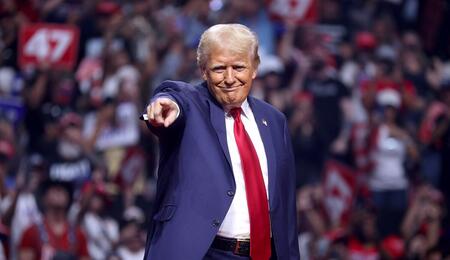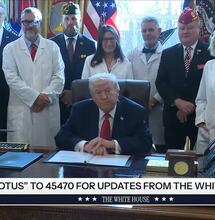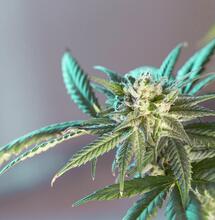Trump’s Turn Toward Marijuana Legalization

With legal marijuana rolled out in 24 states, it’s more than clear that marijuana politics at the federal level will now change whenever a new President sits in the White House. Which wasn’t the case before. Decades-long prohibition meant that administration after administration routinely practiced punitive measures on marijuana. But that has somewhat changed during Joe Biden’s term. Changing the legislative landscape around marijuana is now expected to continue with Trump’s second presidency.
Joe Biden initiated a federal process to review the federal status of marijuana and ultimately move it under Schedule III of the Controlled Substances Act (CSA). He also granted clemency to thousands of federal convicts on marijuana-related charges for simple possession. Although, there were complaints that these presidential pardons were implemented a bit slow. And those would be the top accomplishments of Biden’s administration.
Those who remember, Biden principally vowed to legalize marijuana as part of his presidential campaign for the 2020 elections. The outgoing president did not deliver on that promise. He barely mentioned the word marijuana in the first year or two of his term in the White House. It’s fair to say that cannabis has not been a favorite subject of his, though the same could also be said about Biden’s predecessor and soon-to-be successor in the White House, Donald Trump.
Looking back at the last four years, initiating a review process was the least that Biden could do. Even though, what every cannabis advocate wants, what we all truly want, is complete removal of marijuana from that list.
Cannabis has not been a central interest to Donald Trump either. A lot of Republicans oppose legalization. But the returning president, who will be sitting a second term from January onward, has on several occasions expressed more direct support for marijuana legalization.
Some would say that Donald Trump has taken a surprising turn in his approach to marijuana. However, cannabis was one of the inevitable topics in the last elections. The first elections in history where both presidential candidates openly supported legalization. And perhaps newly-elected Trump stepped up for the popular vote, or to get some liberal votes. Ultimately, his U-turn on cannabis has captured the attention of both sympathizers and critics. Now, those who voted for him and who are pro-cannabis would be disappointed if he also fails to deliver on federal legalization.
Trump Did Not Support Legal Marijuana in His First Term
It was a different story when Donald Trump first took office in 2017. The issue of marijuana was politically complex terrain back then. Despite legal adult-use being approved in several states, the federal approach under the Trump administration remained clearly restrictive, with “zero tolerance” on drugs. Marijuana was not high on the legislative agenda.
Fast forward eight years, more than half of Americans have access to legal weed and there’s an active federal process to reclassify it as a softer drug. There’s also the huge support of the public. A majority of Americans (57%) support legalization for recreational and medical purposes. And more than 30 states have legalized marijuana at least in some form, creating a lucrative industry around it.
Judging by the statements he’s made in the months past, Trump appears to be acknowledging the shifting attitudes of U.S. society toward marijuana. The first significant statement came during a press conference at Mar-a-Largo on Aug. 8, when Trump said that as more states legalize marijuana, he is becoming much more on board with it.
“As we legalize it [marijuana] throughout the country, whether that’s a good thing or a bad thing, it’s awfully hard to have people all over the jails that are in jail right now for something that’s legal,” he told reporters.
Later on, Trump expanded on his Truth Social account: “I believe it is time to end needless arrests and incarcerations of adults for small amounts of marijuana for personal use.”
He also endorsed the ballot initiative for legalization in his home state of Florida, which ultimately fell short. But better bill and better luck for Florida next time.
Should We Be Optimistic for Marijuana Legalization in Trump’s Second Term?
Trump perhaps plans to rescind many of the policies enacted under Biden’s administration. But he just might be playing a different game with cannabis.
David Culver, the senior vice president of public affairs of the U.S. Cannabis Council lobbying group, said in a statement for the NRP that he’s indeed optimistic the new administration will continue the work started under Biden.
“We didn’t see a lot of activity from President Trump, if any at all, on cannabis reform” in his first term, Culver told NRP. “But I think this time is going to be different.”
Trump’s purported change of heart on marijuana could eventually lead to a paradigm shift in U.S. drug policy. Should his administration recognize the growing public demand for cannabis legalization and decriminalization, it could pave the way for a more comprehensive effort to dismantle punitive policies and quicken a more softer approach on all drugs in general. But first and foremost, any legislative changes regarding cannabis would be felt in the sector.
What Would Be the Impact on Marijuana Industry?
Federal legalization of marijuana would be a stupendous change for the American economy. The budding sector is expected to reach more than $20 billion by 2028, thus there’s no discussion about the economic potential here. Legalization could bring billions of dollars into state coffers, create hundreds of jobs, and smooth the path of a safer market.
At first, federal legalization might create confusion with state-level laws. There are also fears that states will lose some of their ability to govern local markets or that they will need to adjust regulation significantly, but it would all depend on how that federal piece of legislation would look like.
In the long run, federal legalization should create more opportunities for business, education and public health programs for consumers that promote a more informed and safer approach to marijuana use. It would also mean reduced space for black market operators and perhaps more serious fines for any offenders that continue to grind on the side.
Finally, legalization should also drive forward the much-needed banking reform and enable current and future cannabis operators to use regular banking services, such as taking loans or just charging cash-free like any other normal business.
All of that does sound great on paper, and it’s great to be optimistic about the future. However, as president, Trump will still need bipartisan support in Congress, which may not be so simple to get. Legalizing marijuana federally by default would mean reshaping other laws in the area of criminal justice, public health and labor to match the new reality. It’s no simple task for any president or administration. And given that presidents and administrations often break their own vows, we should still take every promise or point made by those in power with reservations. There is an opportunity, but there’s always the looming prospect of disappointment with everyone who sits on the nice chairs. Or the unavoidable fact that far too often there comes up something more important than marijuana to decide on.
In the end, let’s just not forget that, above all, marijuana should be free.
Also read on Soft Secrets:
- Cannabis Only Win in 2024 Elections Is in Nebraska












